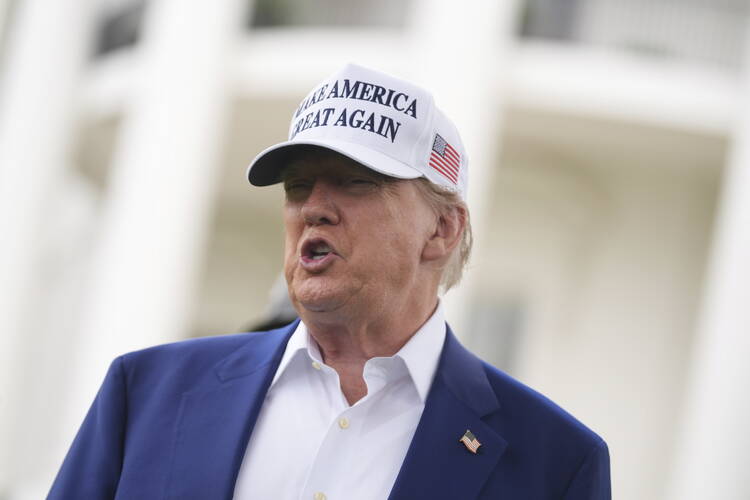Yesterday’s headlines were filled with the news that President Donald J. Trump was demanding Iran’s “unconditional surrender,” prompting a number of questions.
Surrender to whom? Israel or the United States, with whom Iran is not (yet) at war? Would such surrender require only a cessation of Iran’s nuclear program? A change in its regime? Or a kind of military occupation? Has anyone communicated this demand more clearly to Iran? Will Congress be consulted? Did Mr. Trump consult anyone before demanding the surrender of a sovereign country and threatening via social media that the United States is not going to kill its leader, “at least not for now”?
Even as I am writing this piece, Mr. Trump is declaring that “nobody knows” what he is going to do about Iran. I fear that “nobody” includes him.
But asking these questions about Iran crystallized a more basic question that has been bothering me for the past month or so: Why should any of this happen just because Mr. Trump says so?
Even though it seems like it happened last year, given the amount of recent news about the protests in Los Angeles and the conflicts in the Middle East, it was only three weeks ago, on May 28, that the Court of International Trade ruled that many of Mr. Trump’s tariffs were unconstitutional. The court issued a permanent injunction against the tariffs because “the Constitution assigns Congress the exclusive powers to ‘lay and collect Taxes, Duties, Imposts and Excises,’ and to ‘regulate Commerce with foreign Nations.’” (That injunction is currently stayed, pending an appeal filed by the Trump administration. Arguments in that appeal are scheduled for the end of July.)
The Trump administration had argued that the president had the authority to impose virtually universal tariffs based on a law giving him emergency powers to respond to “unusual and extraordinary” threats. In ruling against Mr. Trump, the court rejected that logic. Mr. Trump, the court said, could not simply call a balance-of-payments deficit a “national emergency” and thereby gain unlimited power to do things that ordinarily must be done by Congress.
That legal reasoning seems solid to me, but I am not a lawyer and in any case the finer points of emergency economic powers are not the point of this piece.
The reason I bring up the tariffs case is that it sparked a realization that of course it is not normal or reasonable for the president to be able to completely re-order global trade just because he says he can. Of course it is not reasonable for tariffs to change chaotically day to day based on what Mr. Trump says on social media or in a passing comment to a reporter as part of the deals that he is supposedly working on simultaneously with every major trading partner of the United States.
Of course this should not all happen just because Mr. Trump says so. That is not how a constitutional democracy, based on limited powers and a system of checks and balances, functions. Of course Congress should have to make some decision about tariffs that apply to everything that Americans import.
But from April 2, when Mr. Trump imposed all these tariffs and called it “Liberation Day,” up until May 28, I had been thinking more about the wisdom of such tariffs than about whether Mr. Trump had the authority to impose them. It felt like the court’s ruling helped me realize that the problem is more basic than a disagreement with the president about the right approach to global trade. The bigger problem, as we have known for years, is that Mr. Trump represents a unique threat to our constitutional order because of his disdain for any constraints whatsoever on his power.
It is easy to forget how basic Mr. Trump’s lack of the civic virtues necessary for democracy is. When military conflicts are raging, humanitarian crises are worsening, and immigrants are being arrested and deported without due process, all of these urgent issues feel like they demand an urgent response: Oppose this, protest that, donate for these victims, pray for God to work a miracle to prevent something worse. Worrying about the separation of powers in our democratic system can seem like an abstract concern.
Nonetheless, a substantial portion of the domestic and international chaos that threatens us at the moment is connected to the fact that so much of the economic, military and rhetorical power of the United States is being exercised according to Mr. Trump’s say-so and changing based on his whims.
So if it helps anyone else to wake up from the stupor induced by constant crisis and chaos, I offer this simple question: Why should any of this happen just because Mr. Trump says so?
Even if you agree with some or most of Mr. Trump’s policy goals—even if you want to see global trade subjected to much higher tariffs or to see millions of immigrants deported—shouldn’t he have to convince someone outside his own administration that his plans for doing so make sense, comply with the law and have a decent chance of success? As we can see with the current debate around his “big, beautiful” budget bill, confidence in Mr. Trump seems to be far from universal even within the Republican Party.
Mr. Trump is not the first president to overreach his executive authority or to try for an end-run around Congress, but if such power grabs were problems for other presidents, certainly they are more of a problem at the vastly greater scope and scale Mr. Trump is making them.
Mr. Trump is invoking emergency powers because Congress would be unlikely to give him the power to do what he wants to do under normal legislative procedures. Shouldn’t that matter? Shouldn’t the failure to convince the people’s elected representatives to authorize a course of action lead to some inability to pursue that course of action?
As the president of the United States toys with the possibility of entrenching us in another unjust and unwinnable war without bothering with even the pretense of consulting Congress, I hope and pray that all Americans, including those who voted for him, will indeed wonder whether or not anybody—including him—knows what he is doing.








